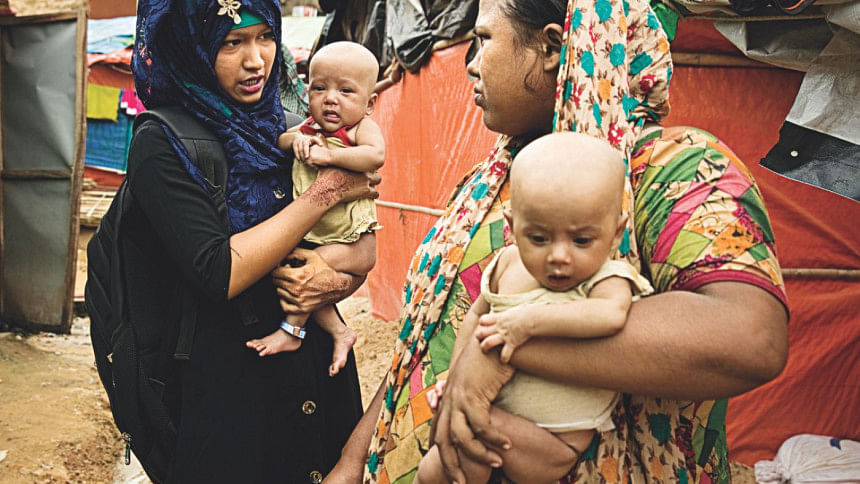A POTENTIAL KILLER HIDING IN PLAIN SIGHT

Balukhali camp: Walking through the refugee camps of Cox's Bazar, children of all shapes and sizes scurry everywhere. The thick mud brought by the monsoon rains is no deterrent to the games of football that attract excited crowds of children and teenagers. So too do the regular handouts of rice and other essential supplies, and the long queues at tap-stands when the water supply is turned on.
Harder to spot are the babies and children who are not receiving the essential nutrients they need to grow and thrive, and who are therefore at risk of long-term consequences to their health, perhaps including death.
This is where people like Amina Akhter can play a life-saving role. 18-year-old Amina is one of around 250 community volunteers, part of whose job it is to patrol the densely packed paths and shelters of Balukhali camp in search of infants and young children up to the age of 5 who are underweight or malnourished.
One of her early successes, just days into her job, was to find six-month-old refugee twins Aseea and Robina. Their mother, Fatema Begum, had brought one of the twin girls to a UNICEF-run outpatient clinic for treatment. But it was only when Amina spoke to Fatema that she discovered the sick child had an even more dangerously-ill sibling still at home.
An examination of both children showed that they were suffering from severe acute malnutrition (SAM), a debilitating condition that has a long-term impact on a child's mental and physical development, and if left untreated can result in death.
Since the beginning of the refugee crisis, SAM has been identified as a major threat to children's health. A November 2017 survey established a SAM rate of 3 per cent among all children under 5 living in the camps. While this figure was lower than previous estimates, it was still worrying enough to ensure that reducing malnutrition has remained at the heart of UNICEF's emergency response, although the focus has significantly shifted.
“Now we have systems in place, building on almost one year of key emergency efforts,” says UNICEF Nutrition Team Lead Saira Khan. “Our approach now is based on mobilising the community, and helping refugees and host community families alike tackle both the immediate and long-term nutritional needs of their children.”
These needs arise largely from factors imposed by the camp environment, including the limited supplies of clean water, the challenging setting for good breastfeeding, and limited access to diverse, nutrient-rich foods that are essential for adolescents, mothers, and children.
The challenge posed by SAM, however, remains very real: UNICEF estimates that over 50,000 children under 5 will require treatment for the condition in 2018.

 For all latest news, follow The Daily Star's Google News channel.
For all latest news, follow The Daily Star's Google News channel. 



Comments